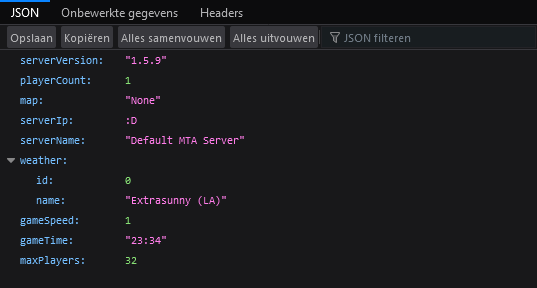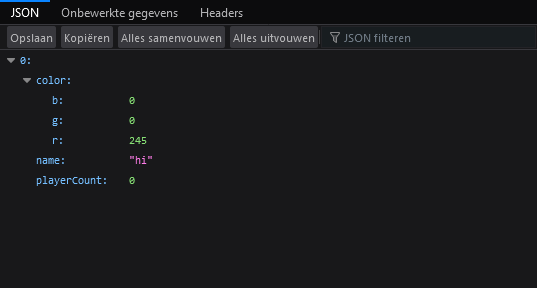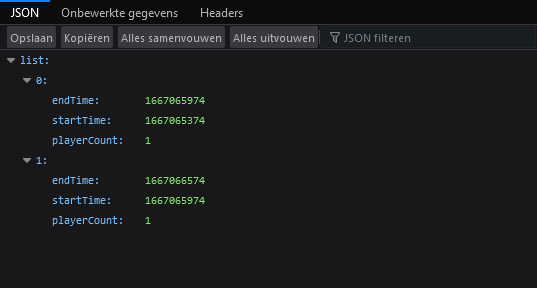-
Posts
6,089 -
Joined
-
Last visited
-
Days Won
216
Everything posted by IIYAMA
-
Just a note. Instead of doing a source validation. -- The source for this event is always 'resourceRoot' if source ~= resourceRoot then reportNaughtyness( eventName, client, "source" ) return end You can also disable propagate: addEvent("onRaiseTheRoof", true) addEventHandler("onRaiseTheRoof", resourceRoot, function(arg1, arg2) end, false -- < disable propagate ) While it does not report naughtiness, it is very easy to add.
-
It is called a Wrapper function. It is used to add extra functionality too an existing function. For example the setElementPosition function. It's syntax is now: --[[ Syntax: setElementPosition ( element theElement, float x, float y, float z [, bool warp = true ] ) -- https://wiki.multitheftauto.com/wiki/SetElementPosition ]] All arguments except for warp are required. An example wrapper function: local _setElementPosition = setElementPosition -- Re-define original function (so that it is still accessible) function setElementPosition (element, x, y, z, warp) -- Overwrite the existing setElementPosition with your wrapper function (it is overwritten, because the function name is the same) if not x then x = 0 end if not y then y = 0 end if not z then z = 0 end return _setElementPosition(element, x, y, z, warp) -- calling the original function end The x, y, z parameters do not have to be filled in any more. They are by default set to 0. The new syntax would be now: --[[ Syntax: setElementPosition ( element theElement, [ float x = 0 ], [ float y = 0 ], [ float z = 0] [, bool warp = true ] ) -- https://wiki.multitheftauto.com/wiki/SetElementPosition ]] Is this wrapper function useful? Not really. ?
-
Change isMapVisible() to isPlayerMapVisible(). https://wiki.multitheftauto.com/wiki/IsPlayerMapVisible isMapVisible is an OOP method. Used like this (if OOP is enabled): localPlayer:isMapVisible()
-
Just a side note (you probably already know this: this can be the same as source, but it doesn't have to be. For example here: local myButton = createButton(0.5, 0.5, 0.1, 0.1, "Click me!", true) addEventHandler("onClientGUIClick", resourceRoot, function() outputChatBox("Button clicked!") end) this is always resourceRoot While source in this set-up is always a GUI element of this resource. For @Xwaw See image below, is the element tree, where you can see some of the main parent elements in MTA. root at the very top is the parent for ALL elements within your game: This includes players, resources(resourceRoot's) > maps/'scripted created elements' and everything that hangs directly under those. resourceRoot is the main parent of each resource. Which can be used to listen to events created by elements that are part of a specific resource. Info: https://wiki.multitheftauto.com/wiki/Element_tree
-
@JeViCo Just wondering if cutting the process in smaller parts would give you the same effect (you never know): local width, height = dxGetPixelsSize ( rawData ) local rawDataTex = dxCreateTexture(width, height) dxSetTexturePixels (rawDataTex, rawData)
-
While the admin acl does have this privilege, that doesn't mean that the resource is a part of it. Instead of giving admin a right that it already has. Add the resource to the admin group. <group name="Admin"> <!-- <<< --> <object name="resource.FILL_IN_THE_RESOURCE_FOLDER_NAME"></object> </group> Note: <group> and <acl> are two different tags. <group name="Admin"> <object name=""></object> <!-- user.<accountName> or resource.<resourceName> --> <acl name="Admin"></acl> <!-- ACL rights linked to this group --> </group> <acl name="Admin"> <right name="" access="false"></right> </acl>
-
There is a difference in /refresh and /refreshall /refresh Refresh resource list to find new resources /refreshall Refresh resources and restart any changed resources https://wiki.multitheftauto.com/wiki/Server_Commands#refresh Maybe you did /refresh and not /refreshall?
-
According to wiki: setWaterLevel ( 100, -- level, true, -- [ bool includeWaterFeatures = true, true, -- bool includeWaterElements = true, true, -- bool includeWorldSea = true, true, -- bool includeOutsideWorldSea = false ] )
- 1 reply
-
- 1
-

-
You could add a return here: https://gitlab.com/IIYAMA12/draw-distance/-/blob/master/scripts/main_c.lua#L156 If the map does not match your list.
- 27 replies
-
- repository
- draw
-
(and 8 more)
Tagged with:
-
I believe the error is about: $input = mta::getInput(); + use MultiTheftAuto\Sdk\Mta; mta > Mta use MultiTheftAuto\Sdk\Mta; $input = Mta::getInput();
-
There are some methods to speed up rendering, but that is only going to work if you can modify the content. https://developer.mozilla.org/en-US/docs/Web/CSS/text-rendering https://developer.mozilla.org/en-US/docs/Web/CSS/image-rendering https://developer.mozilla.org/en-US/docs/Web/SVG/Attribute/shape-rendering
-
That is indeed the case. Syntax: bool triggerClientEvent ( [ table/element sendTo = getRootElement(), ] string name, element sourceElement [, arguments... ] ) Optional argument sendTo is not filled in, therefore it will send to all. To fix that: triggerClientEvent(source, "Emoji5:activarEfecto", root, source ) triggerClientEvent(source, "Emoji5:activarEfecto", root ) triggerClientEvent(source, "Emoji5:activarEfecto", source ) -- or for better performance
-
This resource basically increases the draw distance for all objects. If you want to increase FPS, you have to make compromises which elements you want to skip. At this line you can add a condition or ask someone to create one for you: https://gitlab.com/IIYAMA12/draw-distance/-/blob/master/scripts/main_c.lua#L53
- 27 replies
-
- 1
-

-
- repository
- draw
-
(and 8 more)
Tagged with:
-
A dead coroutine means that this: local SCAN_WORLD = coroutine.create(function() end) function has ended it's execution in some way. Either by an error or just running until the very end. I recommend to start the next async call just before the yield. This will eliminate the problems of resuming dead coroutines. So: STREET_LIGHTS.SCAN_TIMER = setTimer(resumeScan, 1000, 0) addEventHandler("onClientResourceStart", resourceRoot, function() if not isTimer(STREET_LIGHTS.SCAN_TIMER) then STREET_LIGHTS.SCAN_TIMER = setTimer(resumeScan, 1000, 1) end return true end) Run the code for X amount of time and start the resume timer there: (see a version of your current method below) local MAX_EXECUTION_INTERVAL = 3 -- ms local maxExecutionTime = 0 -- inside of the loop if getTickCount() > maxExecutionTime then STREET_LIGHTS.SCAN_TIMER = setTimer(resumeScan, 1000, 1) coroutine.yield() end You might consider balance the STREET_LIGHTS.SCAN_TIMER timer out with the max execution time. function resumeScan() maxExecutionTime = getTickCount() + MAX_EXECUTION_INTERVAL return coroutine.resume(SCAN_WORLD) end ---> math.abs(x) % 100 == 100 This will never be true 100 % 100 = 0 99 % 100 = 99 101 % 100 = 1 500 % 100 = 0 You might consider using 0 math.abs(x) % 100 == 0 if math.abs(x) % 100 == 0 then SCAN.current.x = x print"yield" STREET_LIGHTS.SCAN_TIMER = setTimer(resumeScan, 1000, 1) coroutine.yield() end
-
A coroutine is a kind of thread type, which you can use to put a function to a temporary stop. The coroutine.create method requires a function and returns the coroutine. local co co = coroutine.create(function () end) The coroutine.yield method stops the thread, when it is called inside of the function. local co co = coroutine.create(function () coroutine.yield() end) To start a coroutine you can must call the method coroutine.resume, the first argument has to be the coroutine. local co co = coroutine.create(function () print("A") coroutine.yield() print("B") end) coroutine.resume(co) -- print A -- but does NOT print B To resume the coroutine after yield, just call coroutine.resume again. local co co = coroutine.create(function () coroutine.yield() print("B") end) coroutine.resume(co) -- start -- coroutine.yield() coroutine.resume(co) -- print B Add an async function of any kind (timer) and you are ready to go. local co co = coroutine.create(function () print("A") coroutine.yield() print("B") end) coroutine.resume(co) -- print A setTimer(function () coroutine.resume(co) -- print B end, 5000, 1)
-
You could start with first making sure it works without database. Instead you save it inside of the memory. Unlike elementdata which is bound to an element, this will stay until the resource is stopped. local serialData = {} function setPlayerSerialData(player, value) serialData[getPlayerSerial(player)] = value return true end function getPlayerSerialData(player) return serialData[getPlayerSerial(player)] end -- SET setPlayerSerialData(player, perfectname) -- GET local perfectname = getPlayerSerialData(player) print(perfectname)
-
Is everything clear or do you have any questions? @Dzsozi (h03)
-
Use a database (and manager resource). There are some community resources out there that can help you with that. For example this one (which is not official released on the community resource since I am still building on it, but never the less feel free to use it. https://gitlab.com/IIYAMA12/asyncdatabase Read the readme Modify the config and set to SQLite Check the examples Others: https://community.multitheftauto.com/index.php?p=resources&s=details&id=17541 https://community.multitheftauto.com/index.php?p=resources&s=details&id=6313 Search query: https://community.multitheftauto.com/index.php?p=resources&s=list&name=data&descr=&category=
-
There is a limit code can run for X amount of time each frame. If exceed this amount, the code will abort and you will receive this error. You can use a coroutine in order to temporary stop your code and resume in the next frame. local co co = coroutine.create(function () -- your code START ---------------------- -- inner loop START -- -- if getTickCount > ... then callNextFrame(function () coroutine.resume(co) end) coroutine.yield() -- -- inner loop END -- ---------------------- -- code END end) -- start coroutine.resume(co) Calling next frame: https://gitlab.com/IIYAMA12/mta-communication-enchantment/-/blob/master/sync/sync_shared.lua#L421 (note there are some variables that are defined above the function)
-
Thx @Shady1 P.s. I made some last tweaks for installation script. It seems it for some unknown reason didn't always create a meta.xml file for the API credentials.
-
Serverinfo This resource is a small API for MTA server info, which you can modify / expand to your liking. It is many used to display information about the current state if the server. Like for example how many players are playing. Read the installation carefully, because you certainly do not want to put your admin login credentials online. ? Note: before you even download this resource, test if your web interface is even available. Start your server. Open a web browser and fill in your (local) IP and standard port. If it ask for a username and password, it looks like it is OK. If not, something doesn't seems to be correct. !Server hosts that are based on slots, might have disabled the exposure of the web interface. <ip>:<port> Endpoint: <ip>:<port>/<resourceName>/api/<endpointName>.json Local ip and standard port: http://127.0.0.1:22005 Analytics http://127.0.0.1:22005/serverinfo/api/analytics.json Team info http://127.0.0.1:22005/serverinfo/api/teamList.json Chat history http://127.0.0.1:22005/serverinfo/api/chat.json Generic info http://127.0.0.1:22005/serverinfo/api/info.json Player info http://127.0.0.1:22005/serverinfo/api/playerList.json Download: https://community.multitheftauto.com/?p=resources&s=details&id=18781
-
Try this play ground of mine. Should be working, if not it might be a hardware or setting issue. do --[[ Capture content here ]] local renderTarget addEventHandler( "onClientResourceStart", resourceRoot, function() renderTarget = dxCreateRenderTarget( 500, 500, true ) end ) function captureContent( callBack ) if not renderTarget then return false end dxSetRenderTarget( renderTarget, true ) callBack() -- captureContent( >>> function() end <<< ) dxSetRenderTarget() return renderTarget end end do --[[ Cache renderTargets for static content ]] local cache = {} function cacheRenderTarget( key, renderTarget ) local pixels = dxGetTexturePixels( renderTarget ) if not pixels then return false end cache[key] = dxCreateTexture( pixels ) return true end function getTextureFromCache( key ) if cache[key] then iprint( 'from cache' ) end return cache[key] end end addEventHandler( "onClientRender", root, function() -- When updating content local dynamicTexture = captureContent( function() local size = getTickCount() % 501 dxDrawRectangle( 0, 0, size, size, tocolor( 0, 0, 100, 100 ) ) dxDrawText( "abcdefghi dynamic" .. getTickCount(), 10, 0, 500, 500, tocolor( 255, 255, 255 ), 1, "default", "left", "top", false, false, false, false, true ) dxDrawText( "abcdefghi dynamic" .. getTickCount(), 10, 20, 500, 500, tocolor( 255, 255, 255 ), 2, "default", "left", "top", false, false, false, false, true ) end ) if dynamicTexture then dxDrawImage( 0, 500, 500, 500, dynamicTexture ) end -- When just drawing static stuff local staticTexture = getTextureFromCache( 'static' ) if not staticTexture then staticTexture = captureContent( function() dxDrawRectangle( 0, 0, 500, 500, tocolor( 0, 0, 100, 100 ) ) dxDrawText( "abcdefghi static (not so sharp)", 10, 0, 500, 500, tocolor( 255, 255, 255 ), 1, "default", "left", "top", false, false, false, false, true ) dxDrawText( "abcdefghi static (not so sharp)", 10, 20, 500, 500, tocolor( 255, 255, 255 ), 2, "default", "left", "top", false, false, false, false, true ) end ) if staticTexture then cacheRenderTarget( 'static', staticTexture ) end end if staticTexture then dxDrawImage( 500, 500, 500, 500, staticTexture ) end end )
-
Can you create a smaller version of your current resource, so that we can take a closer look at your problem? (small size is important because we can focus mainly on the problem) Just looking at your current code is a very inefficient method in finding a bug. Best to let the computer do the work for us.
-
Keep in mind that the capture process starts at the left-top of the screen. posx = (sX/2)-(x1/2) dxText ( core, posx+2, posy-max*scrolling, rtW, rtH, tocolor ( 255, 255, 255, 255 ), z2*0.90,font,"left","top",true, true, false,false, true) It might not be captured. local rtW, rtH = dxGetMaterialSize(texture) You already know the size of the render target, no need to compute.







